#I LOST MY THREAD
Text
thought again how overwhelmingly lonely akira would become after everything while time does its healing. u go from having a twenty-something ppl around u at all times to being alone. no one to knock on ur door in the morning, no ppl going in & out, no chaos of sudden fights. even in the (more likely) case where akira forgets its like. this haunting feeling of having forgotten something u shouldnt have. guy who goes to every social gathering ever to have that chaotic energetic experience of having so many ppl around again
#stardust speaking !#meeting some of the most important ppl to u and losing them in a yr is uhhh a lot#akiras had a lot of themes of not wanting to leave their world just yet/see through what theyre there for#as well as questions like 'what will /i/ be doing next time x happens?' in a very...hm. accepting way? casual?#actually idk if theres ever been any point where its been 'yeah probably a year and then we'll see what happens'#but considering akira went from 'i wanna go home;_;' to 'whats the way to make sure all of u are safe in the fight against the moon'#as well as what they knew about them appearing right after their last battle w the moon. theres. suspicions. i am sure of it#either way there Is that one 1.5 segment too.......#I LOST MY THREAD#but. lots of stressful topics too#since akira knows how many wizards THEY had to summon and the implication the old sage summoned at least one too#thinks about some of the drusilla event lines again.....forget being special i wish we had met under normal circumstances......#i had more to say about this topic but it also feels like just repeating myself i just think its gonna SUCK for akira#thinking about some lines in kk's diary too...T_T very akira to me. ill go find them again l8r
15 notes
·
View notes
Text
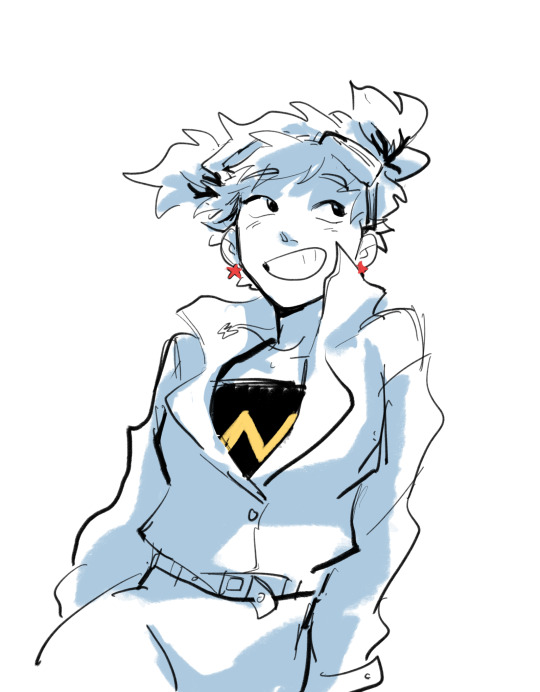
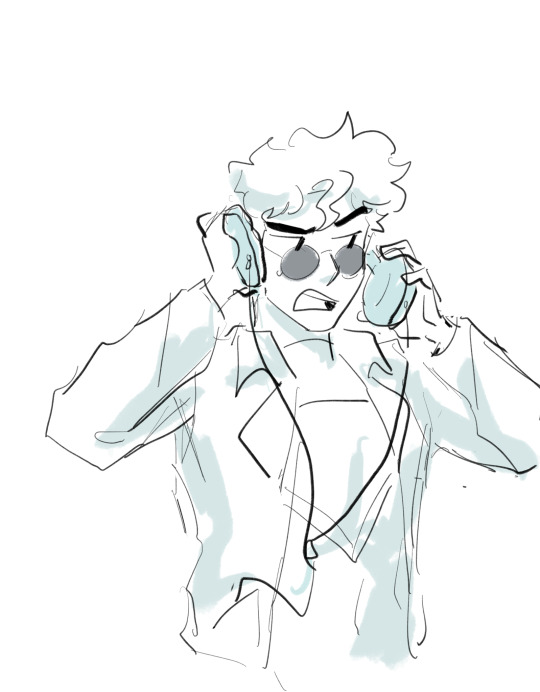
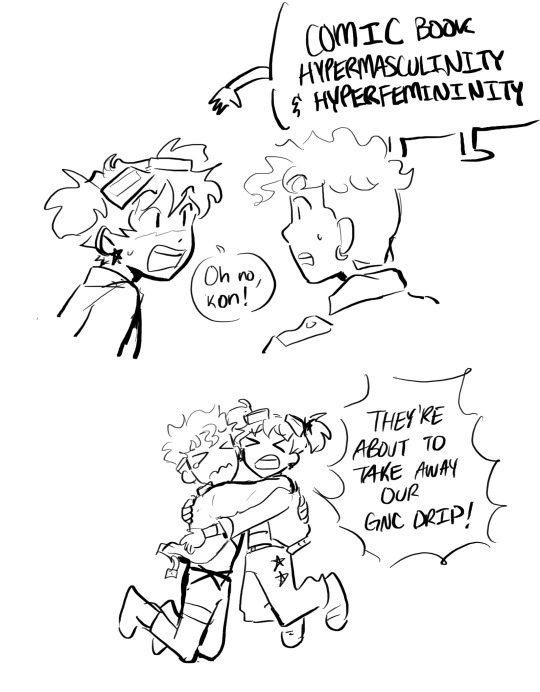

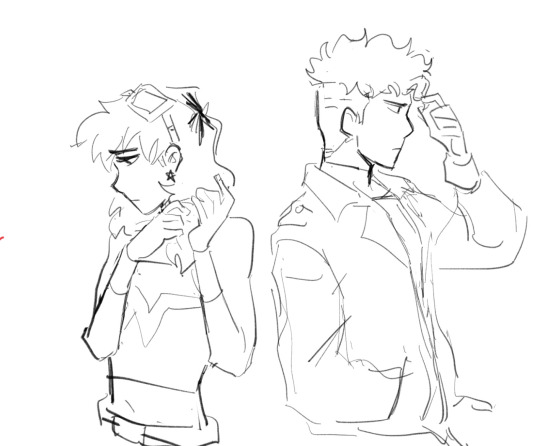
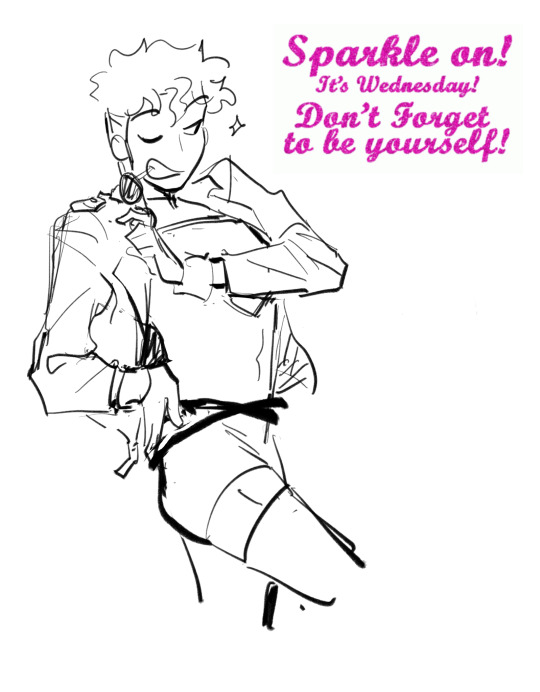
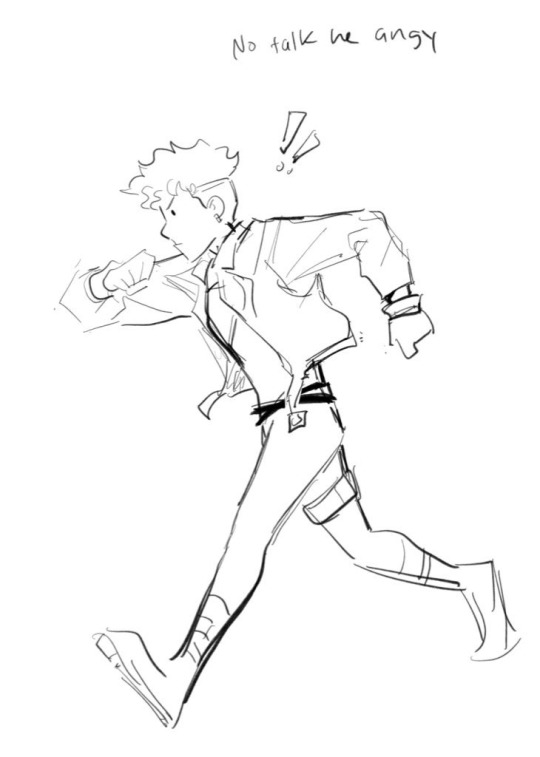
[DC] doodled these two a lot this week
#clam draws#dc#kon el#kontent#Conner kent#superboy#cassie sandsmark#wonder girl#this started bc I was thinking about how they have similar outfits and parallel journeys to like masculinity and femininity I think#and part of it is due to the differences in 2000s and 90s culture but also I think this is geoffs fault#like perhaps Cassie does get euphoria from presenting more femme but it’s written by men who just didn’t find her appealing before#and kon well he already lost the jacket and had designs changes before tt03 but there’s still a noticeable difference I think in the way#he presents himself demeanor wise after johns#and ofc johns meant none of this but I like a silly spider am crawling over it and just making my own narrative threads p#as in like oh they’re in a new stage in their life and they have to wrestle w their identities as one does#but like eventually find a new middle ground?#like yeah I can make a narrative#but if I haddd to choose what they’d do instead like if I were in charge of tt03 and told to make them fit 2000s culture I would have at lea#at least made them grunge or smth idk .#what am I even saying#dc clamics
2K notes
·
View notes
Text
I'm lowkey pissSed that we had a whole chapter from Laurent's pov but there's no Damen around so i DIDNT get to read how he sees him, and describes him, and maybe how he notices details that damen himself obviously wouldn't even point out im sososo mad about this happening to me why did pacat do this ohmy god
#what kind of THINGS would Laurent say about Damen in his HEAD????#he was in deniak but he couldn't escape his mind he could never escape it#not alone and tied to a chair ans#while Damen was out there fighting#he was surely thinking so many thoughts#He should've described to us each minuscule movement of Damen's face while they faced each other again#but oh well haha i guess that's only all in my head now#the fact that we didn't know damen had a simple until the short story was criminal in and on itself#what else can i say#anyway#i lost thread#i love you most ardently Damianos of Akielos
286 notes
·
View notes
Text


The starry purple quilt is finally finished!
#sewing#handmade#starry purple quilt#quilting#made using the Oh My Stars pattern (but modified)#I’ve had the quilt top done for a while but now it’s fully done!#squiggly spiral quilting plus each star’s outline is quilted#purple thread on top (I almost lost thread chicken) and black thread in the bobbin
293 notes
·
View notes
Note
You know how some kids say stuff that freak out their parents like “the man in the corner doesn’t like that” and there’s no one there
or how most kids just stand in the doorway of a room at night for no reason besides waiting for their parents to wake up so they can ask a question but it can be really creepy and freak the parents out
That kind of thing but mostly the second one because I think that’s more common in kids
(previous ask for context)
Alright i totally understand now. That'd be Moja, no doubt!
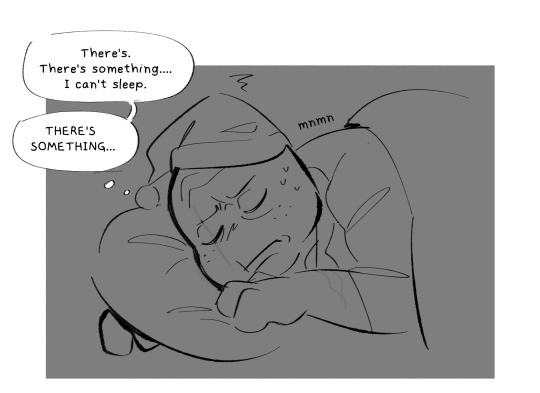

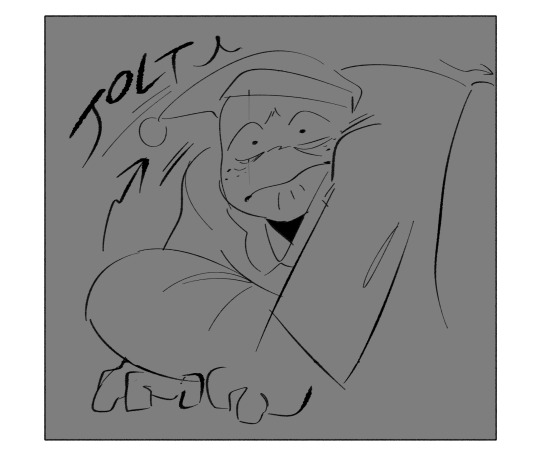




#the thing moja is saying is referencing the reddit of kids saying scary af stuff lmao#also shes around 3 years old because by checking that reddit thread you can actually read a very#prominent number of 2 and 3 year olds in specific that are the ones saying the most scary shit out of nowhere lol#moja would def be one of those kids that used to say the most concerning and scary stuff ever#she does grow out of it though (mikey is very thankful about this but he will never say it out loud)#also if anyone is wondering on how moja ended up with mikeys snork mimimi hat it went like#moja still very sleepy: papa can i have your silly hat to sleep better?#mikey: yeah sure kid#my art#doodles#tmnt#tmnt the last ronin#tlr lost years#tmnt mikey#tmnt michelangelo#tmnt moja#peepaw and babies au#ask
841 notes
·
View notes
Text
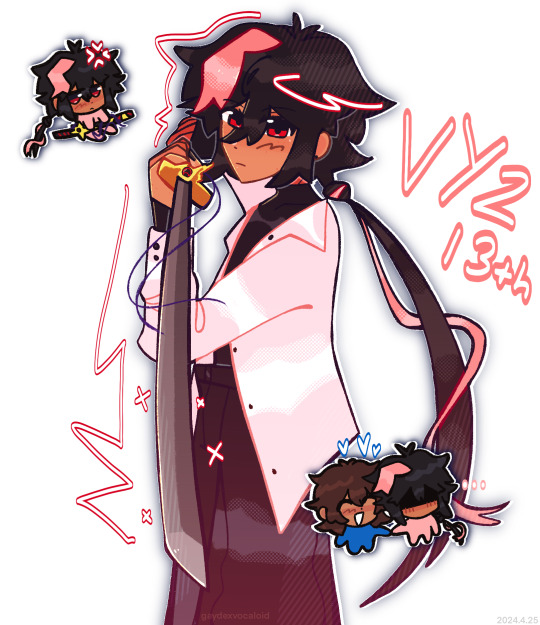
happy bday vy2!!!
#VY2#vocaloid#vocal synth#vocal synths#kyo#zola project#i redesigned my vy2 design bc i just wasn’t happy with how he looked..#the hair takes big inspiration from miodios vy2 design#their design was the first i ever saw for vy2 and i’ve been obsessed with that hair style since bdhsj i hope it’s okay that my vy2 takes#inspiration from it T__T#i wanted to make him look more like his sword#so the red eyes bc the sword has a moon? eye? mark thing near the base#the ponytail has the pink swirling it like the purple thread on the sword#outfit is pretty simple#i kinda lost motiv halfway thru so lmao#anyway#KYOVY2#bubbas.#not super happy with how this turned out but i think i like the new vy2 design#yamaha#my art#fanart#digital art#vocaloid fanart#procreate
78 notes
·
View notes
Text
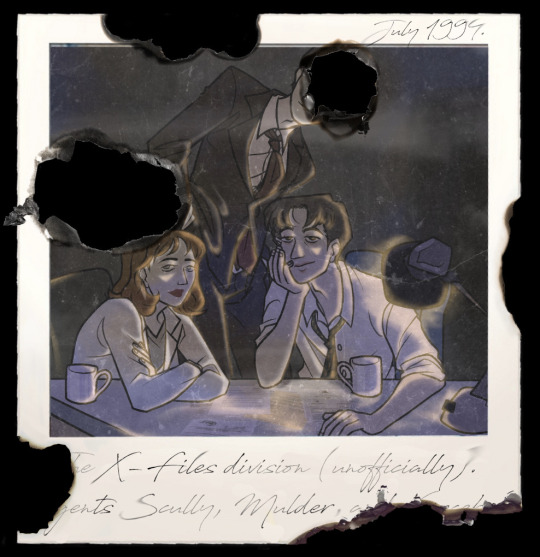
salvaged from the office fire in 1998
#my art#the x files#dana scully#fox mulder#alex krycek#i was talking about this on twitter yesterday but#i have a LOTTTTTT a lot of thought about this part of season two#mainly because i think that while scully probably realized she was never going to find peace ever again after emily#i do believe that the last time mulder ever thought everything would be okay was right before scully’s abduction#which is also kind of why i think mulder was closer to killing himself in ascension than in gethsemane#at the end of season four mulder is kind of resigned to his and scully’s lives unravelling#he’s more suspicious and slower to trust then he ever was#while ascension was the first time he was like. Oh okay. It’s over for us forever and ever#and the fact that he was still open and still kind of okay before that just kind of makes it worse#that he was just betrayed and left hanging and lost everyone he thought he had in one fell swoop#ascension jades the fuck out of him and you can see it. like through the whole series there are threads of it#his tendency to rely on skinner regresses for a while. he becomes even less functional when scully is gone.#he has far less patience for his informants and he refuses to rely on anyone the way he tried to on krycek#like it’s just. such an obvious shift in his character that you can tell his mindset about his and scully’s life has changed#and that’s a huge part of the show’s tragedy i think. there is no peace. there is no rest. it’s never going to be okay
221 notes
·
View notes
Note
Would you be comfortable sharing that flow chart you mentioned in the tags about different ways Black and white people start conversations? It seemed really interesting and practical, but of course no worries at all if not! Thanks!
it wasn't about Black vs white conversation starters specifically: it's about making small talk at work without starting off with assumptions or putting them in an awkward position of having to explain something they shouldn't have to. (E.g. I do not outright ask people where they're from, what they do for work, etc.)
Context: I photograph newborns for work.
Example: Grandparents are usually good for at least three minutes of conversation, but you cannot ask about the baby's grandparents, because there's a non-zero chance that they are deceased (worse: recently deceased) or on bad terms with the baby's parents. So instead I'll say something vague like "is everybody very excited about the baby?", which gives the parents the choices of saying something like "Yes, all my friends are texting me for updates" (inference: they do not have close family; I might follow up by asking if many of their friends have children already) or "I didn't tell anybody I was pregnant" (got that once, it was fascinating, we had a good time discussing how she planned to spring it on people) and "Yes, she's the first grandbaby on the dad's side so his parents are thrilled"
The last one unlocks dialogue options like: oh do the grandparents live in town? No, they live in Nevada? I went to Reno as a kind and it blew my tiny mind. Is that where you grew up, or did they move there later?
Then they'll either say "yes that's where I grew up" and I can ask what brought them here (potentially opening such topics as: their jobs, if they say they came here for work; whether they miss sunnier weather, and so forth) or they can say "no, I grew up in Scranton but my parents retired to Vegas" or just "they moved later" and not mention where they grew up, if that's not information they feel like sharing. Then I can ask if their parents are enjoying wherever they've moved to, possibly fall back on some vague and unoffensive personal anecdote about said place, or go on to my next pre-programmed question* without anyone feeling awkward about it.
Some people are happy to tell me about how they grew up in Ethiopia and where their family is living now and how they came to the US to study microbiology and whether or not they like it here and if they'll be getting the baby dual citizenship and so on and so forth: some people do not, and this usually lets me skip around that without sticking my foot in it. (I'm pretty sure a lot of people don't want to say that they're Russian, for example, which makes me sad.)
The TL;DR is that I try to ask vague/open-ended questions that people can narrow down themselves, if they choose to, or make sure that a question is sort of an either/or so that they don't feel like there's a wrong answer. And I try not to assume anything about them whatsoever: sure, 99% of my clients with Indian names and Indian accents are in fact from India, but once in a while they're not.
*"Do you guys have any pets? if yes: Do you think your pet knew you were pregnant?" [Most people think their dogs noticed the pregnancy, and some suspect their dog was the first one to notice they were in labor. It's fascinating. Alternately they say "no my cat's an idiot," and I can tell them about the time my aunt's cat stuck his face in a candle twice, and so forth.]
#my job#first person shooter#asks#op#sorry i think i lost the thread here a bit#anyway like I always say: when you assume you have to kink tomato out of telepathic space vampire mindfuck noncon
58 notes
·
View notes
Note
How do you feel about Jack Drake?? What are your thoughts on him and Tim’s relationship?
Anon, I hope you were interested in a novel, because look, I am fascinated by Jack Drake. He’s key to a whole lot of what I find compelling about Tim as a character, and if I were in charge of DC, I’d bring him back to life. This would make Tim unhappy but would IMO make for good plotlines.
Jack and Tim’s relationship is Complicated (TM)...

Jack and Tim hug in Nightwing 20 / Jack impulsively yanks a TV out of the wall in Robin 45 / Tim grieves in Identity Crisis
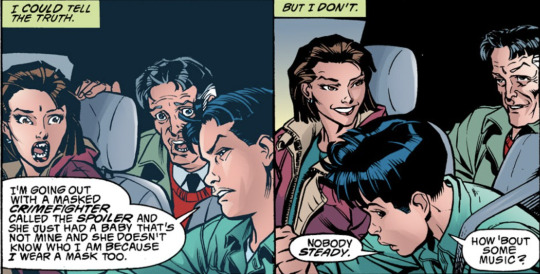
“I could tell the truth. But I don’t.” - Robin 66
...and it involves a whole lot of Tim lying, and feeling guilty about lying, and thinking about telling the truth, and choosing again and again to keep lying.
And I think that’s great.
Below the cut:
Shorter version - key points about Jack
Really long version - my gentler take (vigilantism is choir and Jack loves sports) vs. my harsher take (Jack has some major flaws)
Final thoughts
Shorter version - key points about Jack:
He’s a bad parent. He’s self-centered, he consistently prioritizes his own comfort and interests over his son’s, and when upset, he does things like order Tim off to boarding school.
But he’s never a bad parent in an actionable way. He’s not like David Cain or Arthur Brown, who are abusive monsters. Jack’s not a monster! He just...kinda sucks.
He genuinely loves Tim. If Jack’s aware that Tim’s disappeared or is in trouble, he’s always worried and upset. He periodically resolves to be a better dad, and IMO he’s always sincere.
And Tim loves him, a lot. Tim’s protective of him and worries about him when he’s kidnapped or in danger, and when they’re reunited, Tim’s really relieved and usually hugs him (and Jack hugs back!).
...But they have very little in common, and that’s a problem. Jack doesn’t value the things that Tim values, or respect the people that Tim admires, or care about the things that Tim’s interested in. Tim lies to him a lot, but that’s partly because he correctly guesses Jack wouldn’t respond well if he knew the truth of what Tim’s up to.
The Batfamily is a surrogate family that Tim’s drawn to because of the ways his real family doesn’t meet his emotional needs…but also he feels guilty about that and disloyal. (And to the extent that his dad recognizes what’s going on, he's jealous and resentful!)
Very long version:
(LISTEN I HAVE SO MANY THOUGHTS ABOUT THIS)
Okay! So first: Jack’s a character who IMO is pretty up for interpretation. You can interpret him very charitably, and make excuses for the bad behavior, and fill in the blanks sympathetically when situations are ambiguous; or you can interpret him uncharitably, and emphasize the bad behavior. I don’t think either approach is invalid - it depends on what kind of story you’re interested in! I have enjoyed Bad Dad stories and also stories that redeem Jack.
My personal take on canon is that Jack and Tim’s relationship is in a gray area. Jack's definitely neglectful, and he does prioritize other things over Tim, but he’s never so bad that Tim can easily reject him, and he's never so bad that Bruce could justify taking Tim away. He's just...not great. Tim loves him, and feels loyal to him, but it’s a very mixed-up complicated love.
I have a gentler take and a harsher one which I switch between as the spirit moves me. xD
My Gentler Take (tl;dr: vigilantism is choir and Jack loves sports)
Here’s the core conflict: Jack and Tim are very different people with different values. Tim idolizes Bruce and Dick and vigilantism, and secretly gets involved, knowing his dad will hate it. He gets increasingly wrapped up in his secret world and lies to his dad...because if his dad finds out, he’ll make Tim quit.
This is a great setup for an ongoing comic. It’s practical, because it provides endless potential for plotlines, and it’s nicely thematic, because it maps closely onto relatable real-life situations with extracurricular activities:
Tim the drama nerd whose dad thinks he’s playing football and not in the school play;
Tim the closeted-queer kid secretly getting involved in his school’s politically-active Gay-Straight Alliance;
Tim the choir kid whose dad only values making money and wants him to go into the family business (and Tim keeps promising himself he'll give up choir soon, definitely soon, but maybe he'll stay in just a liiiittle longer, because they need him, you see, the last tenor left town, so...);
Tim the computer geek with the sports-obsessed dad (this one’s just canon);
etc. etc.
The extracurricular metaphor works pretty well for Tim’s relationship to vigilantism. Tim's involved in his "extracurricular" because he genuinely thinks it's important and fulfilling, and he values it and wants to be good at it. He idolizes Bruce and Dick because they're good at it. He's been collecting information about it since he was a little kid, and hiding it from his parents because he knows they wouldn't approve. And mayyyybe there's also an element of low-key rebellion against his dad, and maybe that's secretly part of the appeal. And yet also as Tim gets more and more invested, he starts to daydream: maybe I could tell my dad and he'd be proud of me and supportive. But he doesn't, because actually he knows his dad would be upset and angry and make him quit.
And - again, just like with lonely kids and extracurricular hobbies - one of the things that happens is that Tim starts getting his unfilled emotional needs met ... by people he knows through this secret hobby. And people like Bruce and Dick start turning into a surrogate family. Which Tim feels guilty about. And also as Tim gets more and more wrapped up in their world, he has to lie to his dad even more, which means the distance between Tim and his dad gets bigger and bigger and more and more unfixable.
I love this dilemma. It's simple, it's recognizable, it provides endless sources for conflict, and there's no obvious solution! Tim can't tell Jack: he'll make Tim quit! And Tim doesn't want to quit, because he loves choir / art / theater / whatever. Yeah, it’s difficult, and there are challenges, and sometimes he has doubts...but at the end of the day, he cares about it a lot. And everything he values is there, and all the people he admires and cares about are there, and all he wants in the world is to feel like he's one of them and belongs there. So he has to lie, even though he doesn't want to lie, and he feels guilty about it...
...but also he ends up lying more and more.
(Sidenote: I think it's important that Tim chooses to keep lying - Tim's narration often glosses this as "I have to lie to my dad," and that's certainly how it feels to Tim, but this... isn't quite true. He has to lie to his dad, because if he doesn't, his dad will get mad at him and try to stop him, not because he literally has no choice about it.)
Other Reasons Why I Like The "Secret Extracurricular" Interpretation
(tl;dr it complicates not just Tim's relationship with his dad, but also all his other relationships)
Tim's problems have some obvious parallels to Steph and Cass, who both become vigilantes while rejecting their evil supervillain dads. But Jack isn't evil. And that means the Tim-and-Jack relationship is ambiguous and complicated in ways that I like. Steph and Cass can just leave their Bad Dads in prison, and say good riddance, and feel very righteous and triumphant about it! Tim’s more complicated. Tim gets into vigilantism ostensibly out of duty and altruism, but secretly, he's also involved for straight-up selfish self-fulfillment reasons. He's lonely, and bored, and his life feels pointless, but he thinks that Bruce and Dick are cool and amazing and he wants to be a part of the things that they do. When his dad gets jealous of Tim’s relationship to Bruce, and feels like Tim’s looking for a surrogate family, he’s... not wrong.
And the ways in which Jack is not Actionably Bad complicate things from Bruce's POV. If Jack was a straight-up villain, it’d be an easy call to keep in touch when Jack finds out and makes Tim quit...but he’s not a villain, not really. So what do you do? Do you try to surreptitiously stay in touch with Tim even though you’re ignoring his dad’s express wishes and thus forcing Tim to sneak around? Do you respect his dad’s wishes and stay away from Tim even though you have a years-long relationship at this point?
Again: a bit similar to the extracurricular analogy. Say you’re the choir director and you’ve built this whole relationship with a kid in the choir, and you’re an important mentor to him and you care about him etc. etc. etc.... and then right before a big performance, his dad finds out he’s been secretly involved, and yanks him out. How would you react? Well, maybe kind of in some of the ways Bruce reacts. You replace him. You’re annoyed with him. You miss him. You want him to come back. You’re also worried about him. You’re upset with his dad. But also... what should you do, exactly?
Bruce and Alfred and Dick care about Tim as if he were part of their family, but he’s not part of their family, and there’s a lot of interesting tension there.
My Harsher Take
Jack never hits his son. But his temper is a big deal.
In his worst moments, he takes out his anger on Tim’s stuff - wrecking his room, or ripping his TV out of the wall and confiscating it. When he’s worried about Tim, he usually expresses that fear by yelling at him / punishing him / sending him away - threatening to send him to boarding school in Metropolis in Robin III, or threatening to send him to military school abroad in Robin 92, or actually forcing him to go to an all-boys' boarding school post-NML.
This is bad behavior! It is Not Good!
And you can easily connect the dots to a bunch of Tim’s terrible coping mechanisms, like the constant lying and or the fact that Tim’s go-to methods for dealing with interpersonal conflict are 1) repress it and pretend it never happened (most of his fights with Bruce), 2) withdraw from the relationship until he can pretend the conflict doesn’t exist (when his friends get mad at him in YJ, he quits the team for a while), or 3) literally run away from home.
Also, Jack is a Manly Man with firm opinions about how men behave vs. how women behave, and he thinks boys shouldn’t be scared and thinks Tim should date hot girls and pushes Tim to work out and wants him to play football and expresses period-typical sexism, etc. etc. etc. ... and though obviously this wasn’t what the writers had in mind at the time, all of that is certainly interesting to read backwards in the light of Tim as a queer character.
More Disorganized Thoughts on Jack Drake
Tim’s our hero, so we’re naturally more sympathetic to him, but it’s also true that relationships are a two-way street, and Tim doesn’t value any of the things his dad values, either. Jack at various points is shown to care about grades, business, money, boarding schools, archeology, football, a kind of macho bragging-about-dating-hot-women ethos, and a very public and performative kind of caring. Tim tends to respond with discomfort or disinterest or even disgust. When Jack gets on TV to try to rally the government to save his son from No Man’s Land, Tim isn’t touched—he’s mortified. When Jack makes some bad investments and loses money, Jack’s deeply upset and his self-image is majorly impacted, and far from being sympathetic, Tim’s annoyed and kind of contemptuous of the idea that this is a problem. Jack thinks fishing in the early morning and going to tennis matches is a fun father-son activity; Tim finds it exhausting and tedious. And so on.
This means that Tim often longs to be closer to his dad in theory, but this longing is more tied to fantasy than to reality. He rarely seems to enjoy spending time with His-Dad-The-Actual-Person. So for example, when Tim’s deadly ill with the Clench, he has an extremely poignant fever dream about telling his dad the truth and getting hugged…even as he insists in real-life to Alfred and Dick that he does not want them to tell his dad what’s going on.
The same is true of Jack, who IMO genuinely wants to be closer to his son and is continually declaring that he’s going to turn over a new leaf and get closer to his son…and just as continually backs out of activities or loses his temper when faced with spending time with his actual son.
Tim and his dad sadly get along best—by far—in Absence Makes the Heart Grow Fonder situations. When Jack gets kidnapped or is in danger, Tim worries for him (and Tim grieves him deeply when he dies). When Tim disappears or runs away, Jack’s genuinely worried about him. So e.g. they have a really moving emotional reunion and hug when the earthquake hits Gotham, and Tim panics about his dad’s safety and comes running home (and meanwhile Jack’s been panicked about Tim’s safety!). It’s the day-to-day, regular life stuff where they don’t connect.
Jack's written quite differently by different writers. Mostly, Tim's parents are at their least likable in his early appearances and early miniseries (this is where you get, for example, Jack and Janet being nasty at each other while a pained employee looks on, and Tim disappointed to once again get news of where his parents are via postcard - "I guess that sums them up! Never know where they’re going to be–or when–or even how long!” - and Tim alone on school break, and Bruce and Alfred thinking there's something weird going on with Tim's parents, etc. etc.). Jack's more sympathetic but still often unlikable in most of Tim's Robin solo, and he's almost invisible (but positively treated if he does show up) in Tim's team books.
For obvious reasons, Jack's remembered way more sympathetically after his death. Tim's completely devastated by Jack's murder, which he arrives moments too late to prevent, and he basically never gets over it. We see him grieving Jack again and again in Robin, and also in Teen Titans, and also in Resurrection, and again in the Halloween Special, and again in Batman: Blackest Night, and all the way up to the end of Red Robin. Tim also grieves for an extended time over Janet - he hallucinates a happy reunion with her when he's feverish in Contagion, and hallucinates her in the final issue of Robin, and the reveal-your-buried-emotions song in Robin 102 brings up his grief for her too (meanwhile, other characters dance or laugh or otherwise get giddy). Tim’s grief over his parents’ deaths is intense and long-lasting.
I'm not going to clip comic panels because this is long enough, but if you're curious, here's a nice and fairly lengthy compilation of comic panels with Tim and Jack.
If you're interested in a Jack-centric story with a softer-but-still-recognizably-canon take on Jack, I really like the way Jack’s narration is written in the one-shots Heart Humble (set shortly before Jack dies) and Never a Hero (Ra's resurrects him during Brucequest, and Jack's archeology skills turn out to be unexpectedly useful).
#tim drake#jack drake#ask tag#i wrote this ages ago and now i can't remember what i was going to add to it so oh well draft amnesty? sorry for the long wait anon!! <333#anyway i kept this carefully on topic and virtuously did not derail into talking about the other blorbo but tags are for disorganization SO#for me this kinda half-in half-out place where tim is with the batfamily is SUCH an interesting part of his relationship with dick#and i never stop turning it over in my head#he's kiiiinda replaced dick in that he's robin - but in a very real way he *hasn't* - he's NOT bruce's new son the way jason was#and early!tim makes a BIG POINT of how bruce is not his dad#and i think this relative distance from bruce is a huge factor in why dick is able to build a close relationship with tim at all#(because dick's still pretty estranged from bruce!)#and there's such interesting tension there when dick starts jokingly calling tim ''little brother'' or when villains call them brothers#because they're NOT. increasingly they would both LIKE to be brothers! but dick has zero official standing in tim's life#if tim got hit by a car in his civilian identity bruce and dick wouldn't even be able to visit him without his dad's permission#which jack would be pretty unlikely to give! jack doesn't like or trust bruce!#or like. this is morbid. but if tim died. dick wouldn't even be invited to the funeral you know?#and there's such interesting tension there for me in the contrast between this vigilante relationship that's very very close#but in their civilian lives no one would assume they're anything in particular to each other#anyway the 1st half of tim's robin solo has this thread of tension between tim's family life vs. his vigilante life (plus his mom's death)#and then the second half + red robin has the thread of struggling with grief in a world that's not fair + feeling lost/alone#and these two threads are a big part of my interest in tim as a character! jack's the backdrop that makes a lot of stories possible
482 notes
·
View notes
Text
okay let’s try this again
ate a full meal and went to the gym today. bee 2 depression 0 :)
#i lost my old bee vs depression thread#but also ive had severe depressive episodes between then and now so ig gotata start over anyway#gonna try to tag this one so i dont lose it again#tagging it as#there bee goes#hopefully i wont forget
118 notes
·
View notes
Text
This post from @imminent-danger-came got me thinking about the sun in TDP, well, and let's look into it
First things first:
The Sun in TDP is, currently, set in the most opposition to dark magic. Some of this is because the other primals are relatively unexplored (Earth), are thematically adjacent to dark magic (Moon because of death/deception, Star for obvious reasons, Ocean more recently) or exist on a meta level but not an in-universe one, i.e. Sky magic is set in opposition to dark / star magic through Callum ("my breath for freedom") but we don't know enough about Skywing culture / seen enough Skywing elves to know anything beyond him.
Meanwhile, the absence of the Sun is often seen as synonymous with dark magic
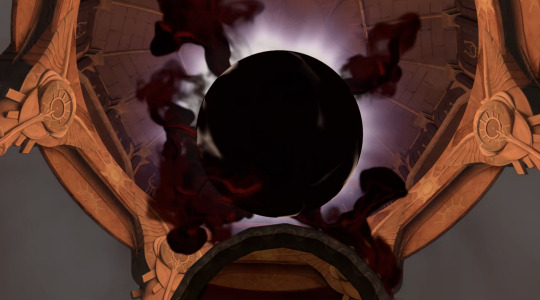
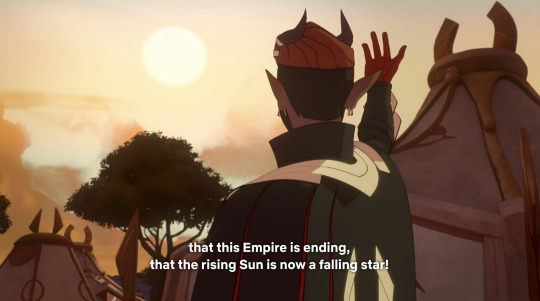
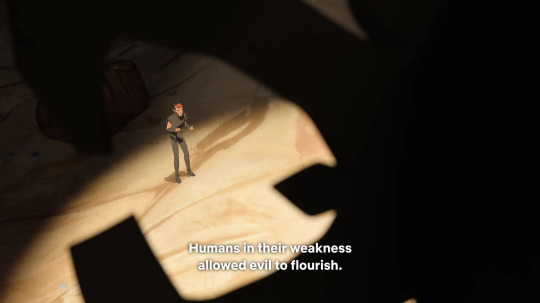
and/or is used to purify / hide and reveal dark magic within the text.

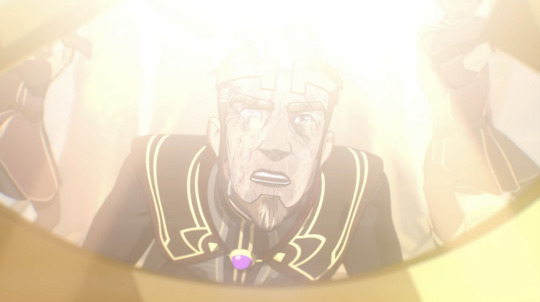
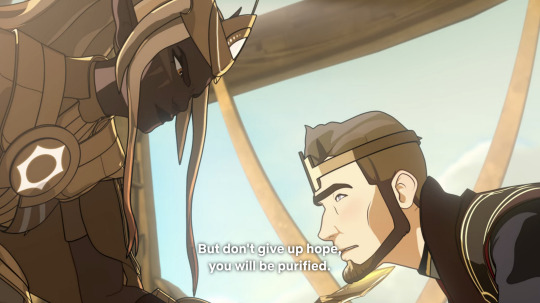
There is a reason, after all, that Karim believes if he can heal Sol Regem's eyes — if he can get rid of the dark magic — that it will let Sol Regem "convince [his people] that the sun will shine again." That Karim thinks "the sun will never shine again for me" is related solely to the physical affects of dark magic, and none of the emotions Sol Regem has felt ("I lost my hope long before I lost my sight").
We see this dichotomy of light being more good and nighttime/darkness being more bad even in S1, as Harrow and Viren hope to find the Moonshadow elves ("in the light of the day") before they become unstoppable / death incarnate at night and at the Cursed Caldera, in which Ellis asserts that come nightfall, "the nightmare is about to begin".
However, as you can probably already tell, this relationship of Sun vs dark magic as oppositional forces is already more than muddled just as the dichotomy of light = good and dark = bad in the show is, too.
We see this prominently with the repeated combination of corrupted Sun magic not only in the hearts of cinder spell that Viren used the relic and sun staff to create, but also in Claudia's continual wielding of the corrupted sun staff
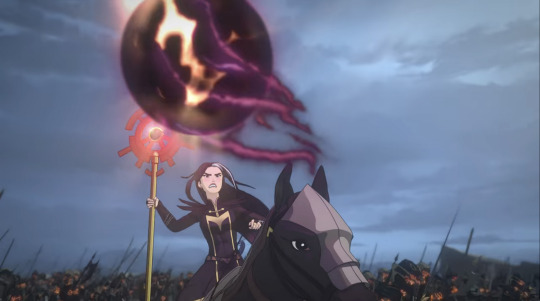
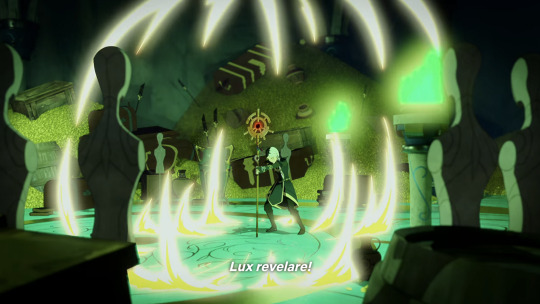
and in Karim's employment of Kim'Dael. Karim just implied that humans allowed evil (dark magic) to flourish because they were weak ("You are lesser beings") just as Sol Regem believed, and it seems Pharos is thinking along the same lines here: isn't Kim'Dael "evil" because she uses dark magic too?
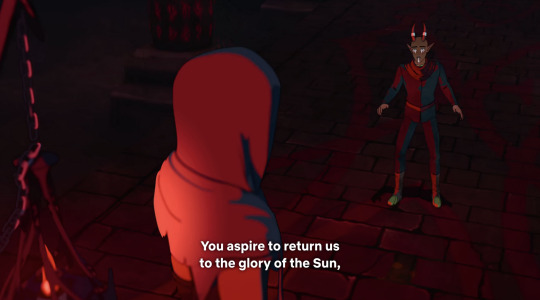
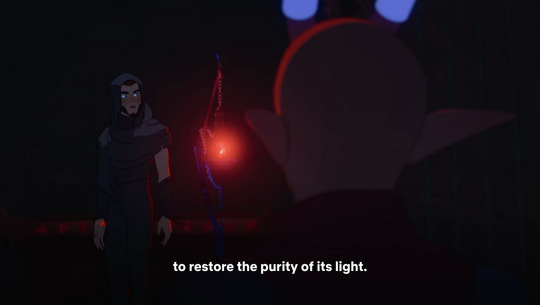
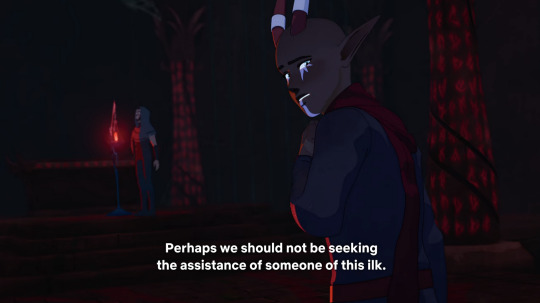
Because she's a Moon dark magic, and the opposite of the Sun and purity and light in every way he can think of, even when Pharos — a Sunfire priest who believes in Karim — has been corrupted and infected, too. And yeah some of this is to point out Karim being hypocritical and losing his way and inevitably things, such as him having the Sun Seed, are not going to go according to plan.
But I do want to take it one step further and say that the Sun — seeing a new day — is not necessarily void of dark or Star magic-y connotations, after all.
Whether it's the importance of the Sun's first light, spoken by mages who are either unknowingly (and likely to be) pawns of Aaravos
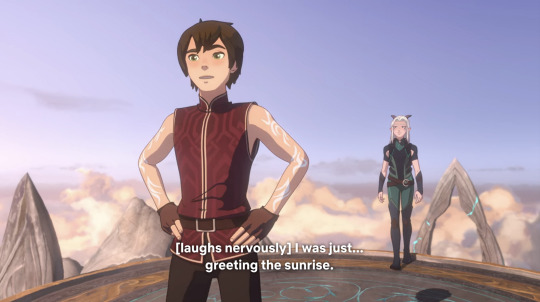
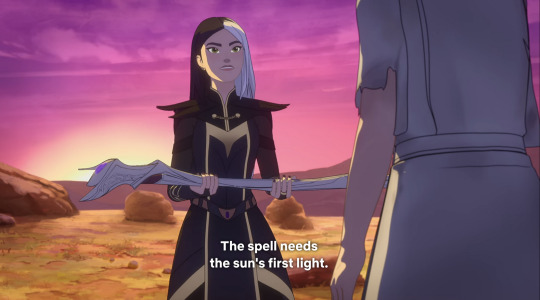
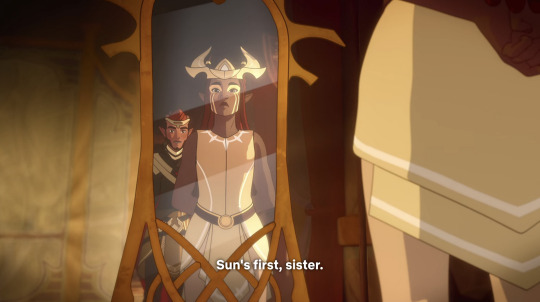
or that doing dark magic and playing into Aaravos' hands would've secured Viren seeing a new day.
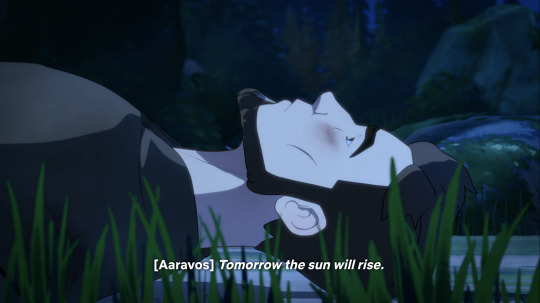
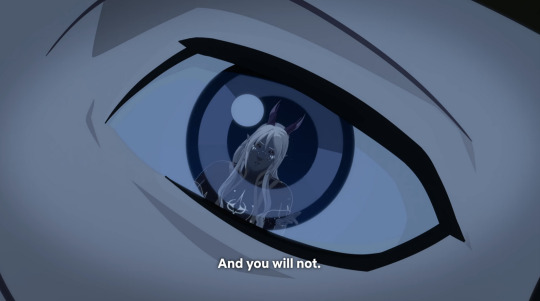
Although dark magic is, seemingly, more associated with night because, well, darkness, obviously...
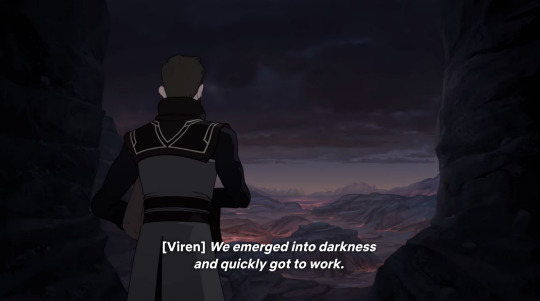
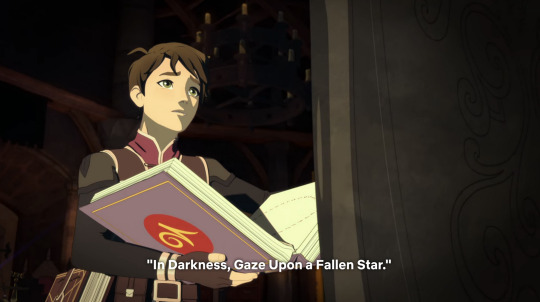
It's not just that the Great Orb was corrupted, but that Lux Aurea itself fell, giving way to corrupted creatures, infected by another combination of Sun and Dark magic
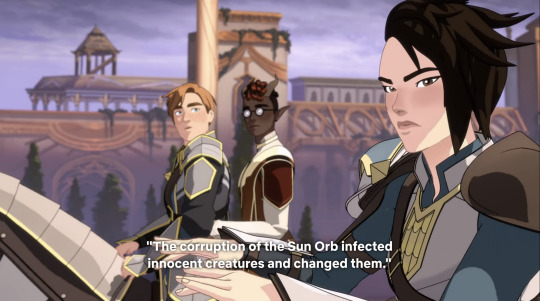

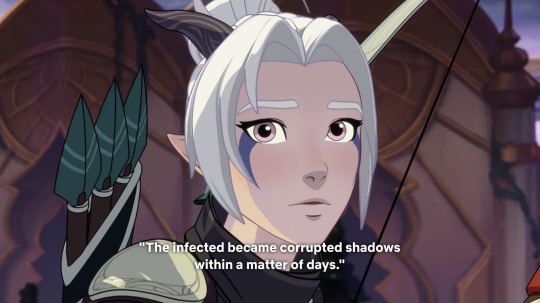
It's that dark magic, I think, grows and festers and consumes everything until light and dark — day and night — are synonymous with each other, until they become a singular thing like Aaravos. That there's no escaping it. There's no "choice".
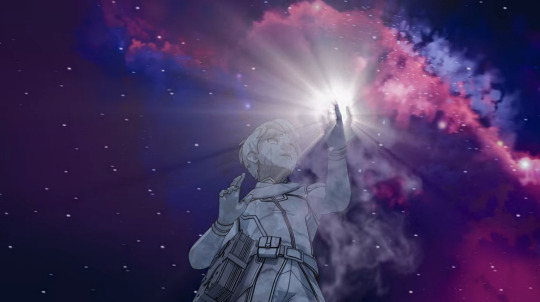
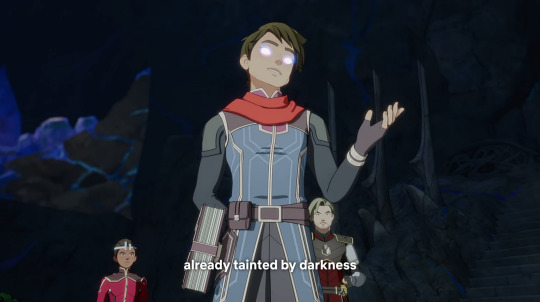
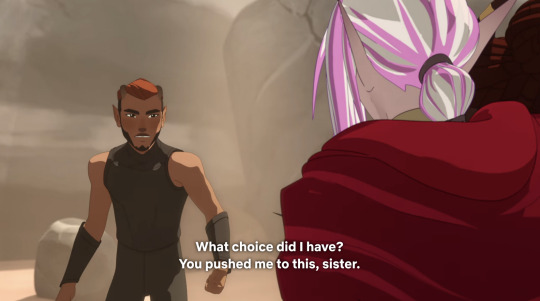
Or at least, that's what it wants you to think.
#tdp#tdp meta#the dragon prince#analysis series#primal magic#dark magic#analysis#parallels#multi#i feel like i lost my thread half way through but listen. i had fun#light and darkness motif#theme: duality
49 notes
·
View notes
Text
i actually take it back. no one should read the tolling bells by @edsbacktattoo bc it will make tears inexplicably come out your eyeballs, even tho you're a strong, independent woman who doesn't show emotional vulnerability for normal mentally well reasons, and this will inevitably lead to a headache, and then you will spend the next several hours complaining to anyone who will listen that you have a headache, did you know i have a headache? my head really hurts, you guys
anyway, definitely don't read this, it may irrevocably alter your immortal soul in a way that is potent and yet indescribable with the words available to you in the english language. (idk about other languages, i haven't tried)
also, it might give you a headache. did i mention that part already? just sayin'
#definitely don't click that link#don't go and have your heart turned to stone#only to find that having it resume beating hurts even worse#-george washington voice- dying is easy young man living is harder#sure let's quote hamilton in a post about ofmd fanfiction let's just accept that's where this life has led us to why not#guys my head rly hurts#and i'm being so brave about it#(no i'm not)#(i'm being a whiny bb and i want someone to bring me four ibuprofen and a juice box)#i think i've lost the thread of these tags#i also might not have slept that long#a n y w a y#blackbonnet#blackbonnet fic#ofmd#ofmd fic
29 notes
·
View notes
Text
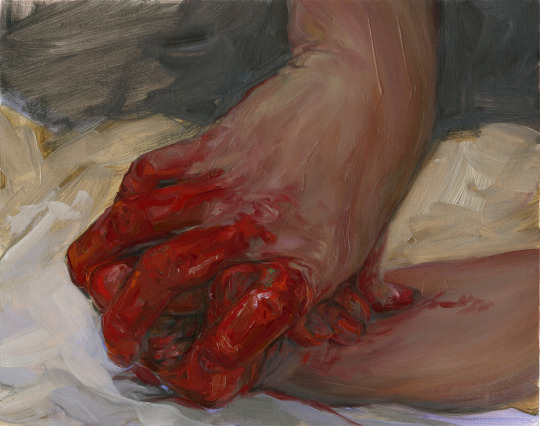

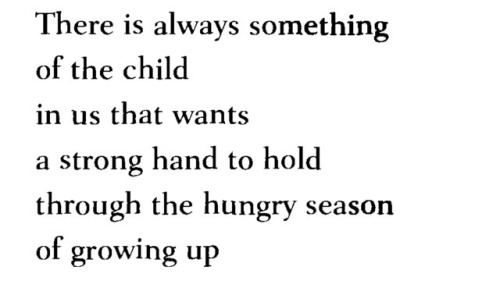




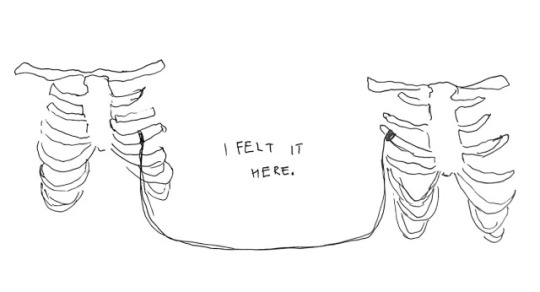


Connection // Consumption // Possession is my way of Love & you are mine as i am yours, various - a web weave for it's quicker & easier (to eat your young) by @pinkcannibal 💖
#IM SO INSANE ABT THIS FIC IM SCREAMING I LOVE YOU I LOVE YOU I LOVE YOU#anyways hehe#web weaving#marilyn thornhill#marilyn thornhill x reader#christina ricci#lee makes stuff#simp.txt#clown.txt#to me i am hers the same way she is mine and we are two halves ripped apart and 2 puzzle pieces who's been lost in the dark#and we are connected in the same way the greek gods have created soul mates and connected in the same way the fates have woven their thread#and we are one in the same one in the same one in the SAME!!!!!!!!#bound by blood and by love and by our sheer force will and i want nothing more but to sink my teeth in to her neck just as she does mine#and claw my way into her chest and fall asleep next to her heart raw and bruised and bloodied#i am. being SO normal abt it.#eat your young
81 notes
·
View notes
Text
Okay but what I can’t get over is when you meet Anders, and he explains Justice, he says his anger and hate corrupted Justice and overwhelmed him—changed him—and he’s miserable and guilt-ridden and full of so much self-hatred and fear of hurting someone he loves again and certainty he will, that he takes THREE YEARS of being in love with Hawke who is actively pursuing him, before even considering risking a relationship.
And I fucking believed him. I thought ‘That makes sense. Spirits are influenced by how they’re believed to be (a great example being the awful things that happen to poor Justice on a Rival!Path in DA2), and their environment, and what they’re pushed to do. He’s clearly not a demon, which tracks, because that only happens to a spirit corrupted completely away from their core being, and Justice and Vengeance aren’t antonyms—they have solid overlap. So, it’s more like he’s unstable and a little bit shaky in his sanity, dealing with this, but still very much a spirit and himself—just also sort of unwell.” It made sense. I really thought Anders would understand what was going on.
It wasn’t until beating the whole fucking game and having complete context, that I was able to look backwards and realize that’s entirely wrong. In Awakening, Justice has /exactly/ the same personality as in DA2, just more stable and calm and curious, less unwell and fractured. That’s what I said before? No, not exactly. What I mean is, Justice pushes Anders in Awakening to consider a more active role in defending Mages. He’s forceful and passionate about doing the right thing—hell, when you meet him, he’s championing a bunch of humans in the Fade to save them from a demon by force. He changed, yes. But it wasn’t his personality. It was his stability.
Anders’ feelings of anger and hate and desire for justice and vengeance didn’t hurt Justice at all; those feelings are all just ones. It was his fear and guilt that did. It was the way he’s been raised his entire life by the Chantry to consider himself dangerous and violence dangerous and action dangerous, and caring too much, fighting back, standing up, using magic to fight back, all dangerous and bad. It’s his /fear/ that he is wrong and bad. It’s his religious trauma over his own existence biologically as what he is. Justice didn’t change. Anders was afraid of what he and Justice did—were able to do—what Justice did to protect him. And immediately assumed he was the monster and he was at fault, because as much of a rebel as he is and as much as he believes Mages are not monsters and deserve to be free, like basically all minorities who had to unlearn the bigotry they experienced their whole life, he has not been able to stop applying to himself rules he long ago stopped apply to everyone else in the world.
And that fear, that belief Justice had been warped and hurt by him, and schism in his own mind about not just what Justice means, but what it means as it relates to him and what he’s allowed to do and want, and it making him evil as a person to pursue even if he thinks it’s right, /that/ is what warped Justice. That’s why Justice is unstable and unwell and their relationship is fractured and strained, despite caring for each other, and Justice’s overwhelming desire to help Anders. Anders is terrified not of Justice, but of himself. And in retrospect all of this is made so clear by his two paths in DA2.
Since gaining Justice, Anders was immediately attacked and almost killed by another Warden, and had to flee, and it was bloody. He ran to Kirkwall and kept his head down, struggling to help as a doctor for refugees in the slums, risking freedom and life every day by practicing magic as an apostate. He’s utterly alone. He spent years fleeing the Circle and being dragged back. As a youth, he fell in love, and they separated him and his boyfriend and took him to another tower. He kept trying to escape. He was left in solitary confinement for an /entire year/ after his seventh escape. The wardens saved him, and he had a home and freedom for like 6 months in awakening, then the Wardens bowed to the Chantry’s demands and initiated a Templar to follow him literally everywhere like a prison warden and that hard earned freedom and community was lost. He saved Justice’s life by letting him live in his body, but in doing so was proclaimed an abomination and almost killed on the spot by the Templar Warden, and fled, alone again. In Kirkwall, he isolated himself to try to keep others safe, and spent his time healing. Then he meets Hawke, and goes to save his first love from being made tranquil, only to find the Chantry is using their own church to bait him, and he has arrived too late, Karl is gone, and he is nearly made tranquil himself, then forced to kill the only person he’s ever loved when Karl regains his person for seconds and begs him to do it before he’s a mindless slave again.
From here, he spends the next 7 years helping heal Hawke’s team, smuggling Mages out of Kirkwall to save them as part of an Underground Railroad, championing mage rights and protesting, writing manifestos, healing refugees and the poor, and doing everything in his power to make the world better. No one in Hawke’s party, except determinately Hawke (and determinately Bethany as well, before, well), takes him and the plight of Mages seriously. He’s treated as an extremist and an annoyance and over the top for regularly talking about the fact that, you know; his minority group literally is being killed in the streets and turned into mindless slaves for the church every fucking day, and no one is stopping it. He becomes more and more desperate and isolated and the situation gets so bad, Justinia has ordered an Exalted March to purge Kirkwall, and Meredith has sent for the Right of Annulment to kill every mage in the circle, about half way through Act 3. And still, no one does anything. He’s completely alone, even in just, fucking validating the severity of the suffering and death and injustice they face.
If Hawke treats Anders like a monster, like an abomination, and Justice like a demon? Over the course of those 7 years of being dismissed, abandoned, and outright attacked by the closest things he has to friends, he becomes less and less stable, more and more lost to the Chantry fears he’s a monster, less sure of himself and his identity, more alone, and confused, and broken, and hopeless. Pulled in too many directions and giving up in despair and trying to fight at the same time. And Justice gets worse. He becomes believed by everyone to be a demon, until even Anders is uncertain and afraid of them both. And then Justice is torn between hurting Anders, and letting innocents die, both of which go intrinsically against his nature as a spirit, and what happens to Justice is what happens to any spirit forced to be and forced to act outside of its nature: he begins to be warped into a demon.
If Hawke is a friend to Anders, and he is not alone in his fight for his people. If Hawke helps him, and reassures him, and he is able to stabilize his mind and emotions and realize he’s not a monster, and his cause is just, he and Justice stabilize together, and no longer have even the issues they do in Act 1, because his warped view of justice and his fears are overcome, and with Justice’s sense of self not constantly threatened, the problem is removed. They both get to be happy, and well, and cohesive. It empowers Anders to see he’s right and just, and to make hard choices rationally, and find who he is and what he wants, with great assurance and passion, and Justice to retain who he is and stay a spirit, while both help the world.
And anyway it just makes me extremely upset that Anders even with all his conviction and belief, has still had such fear and guilt over his very being drilled into him by the Chantry, that he truly believes he’s the monster in his relationship with Justice, and a danger to everyone around him, and it’s the Chantry the whole time. It always has been.
#dragon age 2 spoilers#dragon age 2#Anders#Anders dragon age#justice dragon age#da justice#da anders#I kinda lost the thread for a moment there getting distracted about the plot structure as a whole but my point stands and it’s VERY upsettin#chantry what /haven’t/ you guys royally fucked at this point? anyone? anythjng? at all?#spoilers#I wish he could blow it up /again/. some poetic justice that bomb is basically where Karl stood#if you reblog this post with Anders negativity I will /kill/ you
999 notes
·
View notes
Text
I'm playing TW1 again and I have thoughts about this tiny little sequence in the Chapter 2 quest "Memories of a Blade", which amounts to the only mention of Coën in the game.
When undertaking this quest, Geralt is investigating the origin of the silver sword he was given to slay a cockatrice; he mistakenly believes that it might be Berengar's sword since he knows the other witcher to have been in the area. A conversation with Thaler, from whom the sword was confiscated by the guard, will lead him eventually to speak to the Gardener outside St. Lebioda's hospital in Vizima. This man used to be a mercenary under Pretty Kitty, but has since retired and works as a gardener, and had lost the silver sword at dice poker. When interacted with, he will begin any conversation with "Look how they grow!", referring to the plants in his garden. The player can then initiate the quest dialogue with option one, "I'm more interested in silver swords".
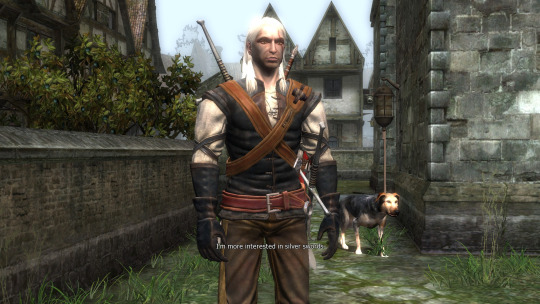
GERALT: I'm more interested in silver swords.
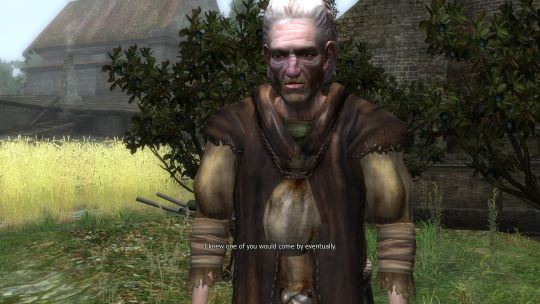
GARDENER: I knew one of you would come by eventually.
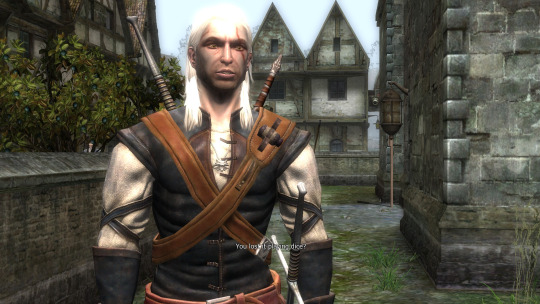
GERALT: You lost it playing dice?

GARDENER: I was sure I'd win. Beware, the sharp one plays well.

GERALT: Where did you get this sword?
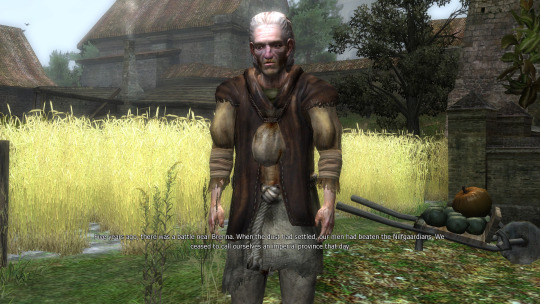
GARDENER: Five years ago, there was a battle near Brenna. When the dust had settled, our men had beaten the Nilfgaardians. We ceased to call ourselves an imperial province that day.
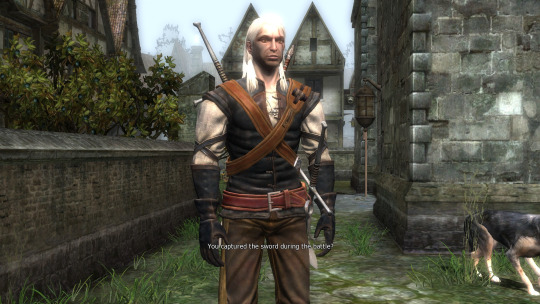
GERALT: You captured the sword during the battle?
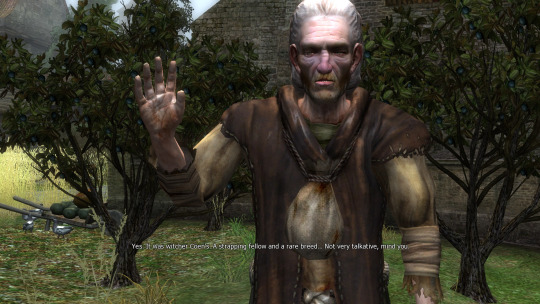
GARDENER: Yes, it was witcher Cöen's [sic]. A strapping fellow and a rare breed. Not very talkative, mind you.

GERALT: Like most of us.

GARDENER: I gave my word the sword would find another witcher. As he lay dying, he mumbled about teeth and destiny. Then he laughed -- at his own death.

GERALT: Yet you lost it gambling?
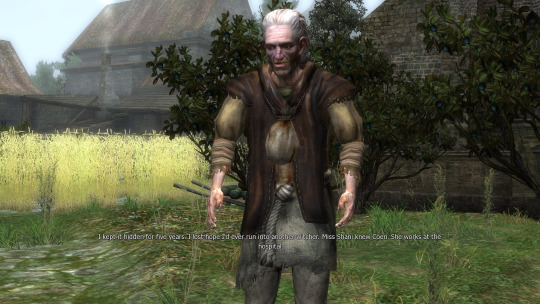
GARDENER: I kept it hidden for five years. I lost hope I'd ever run into another witcher. Miss Shani knew Cöen [sic]. She works at the hospital.

GERALT: Thanks.
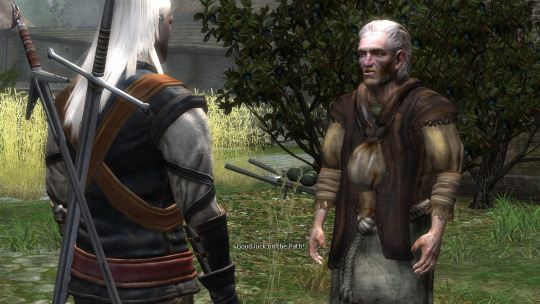
GARDENER: Good luck on the path!
The quest will lead you to speak with Shani, then Zoltan, but neither will provide further information on Coën, aside from Shani mentioning that he died on her operating table -- Shani's dialogue is to provide her backstory as a medic at Brenna and to mention Rusty, and Zoltan simply assesses the quality of the blade to ensure that it is a witcher blade of good workmanship. It has no further significance to Geralt, who, without his memory, has no idea who Coën is and has more pressing matters to deal with than to look into the past of a man who died five years ago (according to the somewhat off-kilter game timeline, anyway). But it's the only mention of Coën in the games, and I find that it's a very interesting way to manifest his presence.
I think it is reasonable to tie Coën quite closely to his sword on a symbolic level, if one considers his appearance in the novels where he not only trains with Ciri, but his prowess with a sword is unrivaled even by the other witchers to the point where she believes that he may be the best swordsman in the world. Additionally, the fact that he fought at Brenna at all means that he offered his sword in the service of the Northern Kingdoms, and when he dies, he is identified by his peers as a "master swordsman" rather than as a witcher, despite the fact that they know of his nature. As such, Coën's sword is a very important possession for him to leave behind.
And from there, there is a connection to Lambert, left unsaid. To go beyond the simple fact that Coën was Lambert's friend, someone dearly loved who was close enough with Lambert and his family to get on with the other wolves and stay a winter at Kaer Morhen, the importance lies with the sword. As with any witcher, Coën wouldn't have much in the way of worldly possessions to bequeath onto someone else in the event of his prophecied death. But he does have his swords, which are established as symbolically important to him. A steel sword could be taken up by any warrior capable enough to use it, but a silver sword belongs in the hands of a witcher, and that is what Coën asked for on his deathbed, for his silver sword to be given to another witcher. While it's very possible that this is meant in a general way, that he just wanted any other witcher to take it up, to avoid the sword being wasted, broken, or dismantled for its composite parts, it also strikes me as possible that he could have intended it for a specific witcher.
Lambert is one of the instructors for Ciri when she's first learning the swordplay and acrobatics associated with being a witcher. Lambert is the one in the first game to provide the instructional descriptions of the Fighting Styles for Geralt to regain his swordplay competencies after losing his memories. And there is another bit of dialogue in TW3 that really emphasises both Lambert's connection to Vesemir, the swordmaster of Kaer Morhen, and the idea of swords as inheritance, as a manifestation of closeness:
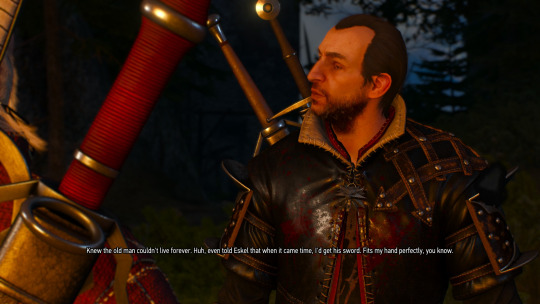
LAMBERT: Knew the old man couldn't live forever. Huh, even told Eskel that when it came time, I'd get his sword. Fits my hand perfectly, you know.
Which is a heartbreaking notion in and of itself upon which I could expostulate, the symbolism there in the fraught relationship between Lambert and his father figure reduced to something as simple as a hilt that fits two hands perfectly. But if this is the inheritance that Lambert wants, it makes it all the more pertinent that Coën desperately wanted his silver sword to make it into the hands of another witcher. Lambert, the son of a swordmaster, wants to take on a sword as a memento of someone he has lost, and Coën, the master swordsman, left his sword behind. Even if Lambert were not the specific intended target of the sword, he would have possibly or even likely known Coën well enough to fulfill his wishes, whatever they might be.
And yet Coën's sword never makes it home or into the hands of someone who would value it, like Lambert would, this last memory of his dear friend. Geralt makes use of the sword during his time in Vizima, and then it is lost, replaced by the gifted Aerondight. And so Coën is lost with it, never mentioned again.
#rambles#the witcher#the witcher games#lambert#coën of poviss#shoutout to the dog that wandered through some of these screenshots what a good boy#anyway i am back on my tw1 bullshit#coën my beloved#it makes me so sad that he's never mentioned again#especially with the creation of aiden in tw3#like#lambert has already done this#he has already found a good man that he considers a dear friend#and then lost him brutally#and yet they don't mention coën at all in 'following the thread'???#wack#like geralt knows this about lambert#he knew coën too#and yet there is not even the slightest reference#i mean in tw1 it makes sense for geralt to not lend much significance to the name of a dead witcher#he has no memory of coën#but by tw3???#he has his memory back he must remember#and to join lambert on his revenge quest for aiden#where lambert has again lost someone very dear to him and does not have anything by which to remember him#there is no reference at all to the fact that two years ago geralt literally owned coën's sword#i mean i get that they might not want to be so specific because like seven people total have played tw1#but at least mention my boy coën#come on#as an aside i do think it is nice that even though coën is barely mentioned he is remembered fondly
69 notes
·
View notes
Text
Sis preordered this for me for Christmas months ago and my Hellhound (aka Jane Hind) squishable is finally here! NOW I HAVE MY HOUND OF HELL'S KITCHEN AND A BEARDEVIL, THANKS I LOVE IT

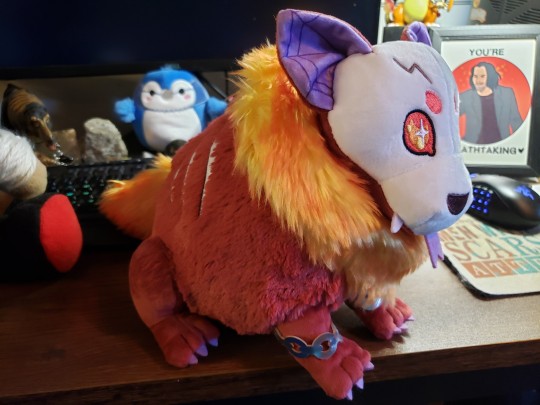
#the red thread#i have a hellhind and a beardevil my life is complete#she also replaced my beardevil this Christmas after i lost the old one to fiberglass!#this is my otp thanks
23 notes
·
View notes